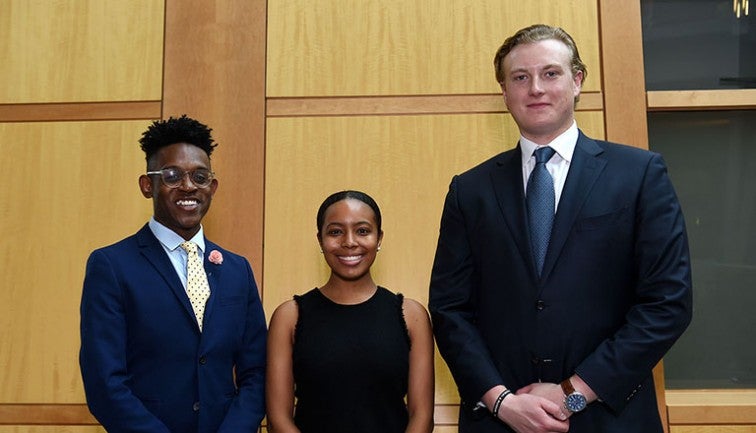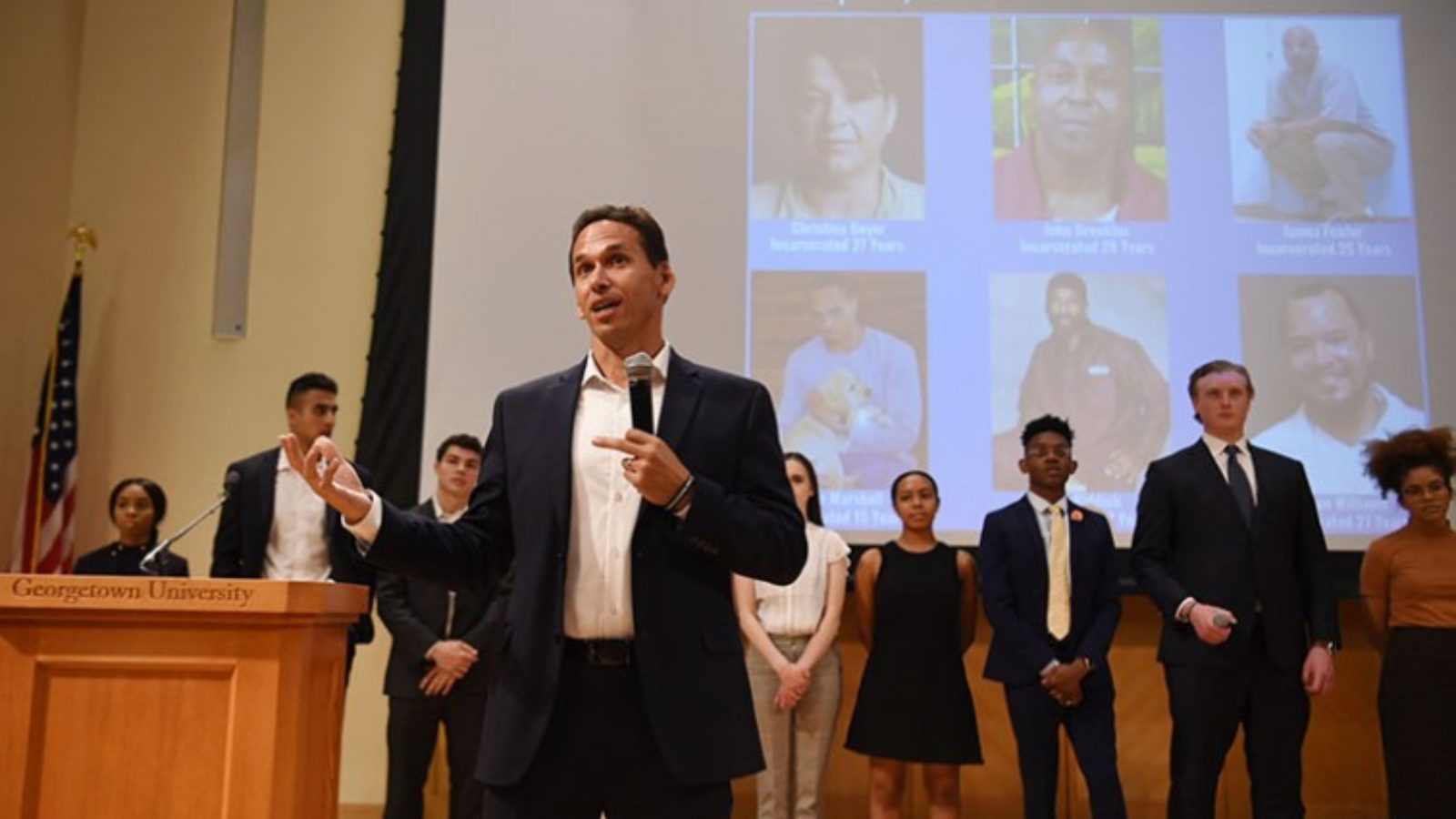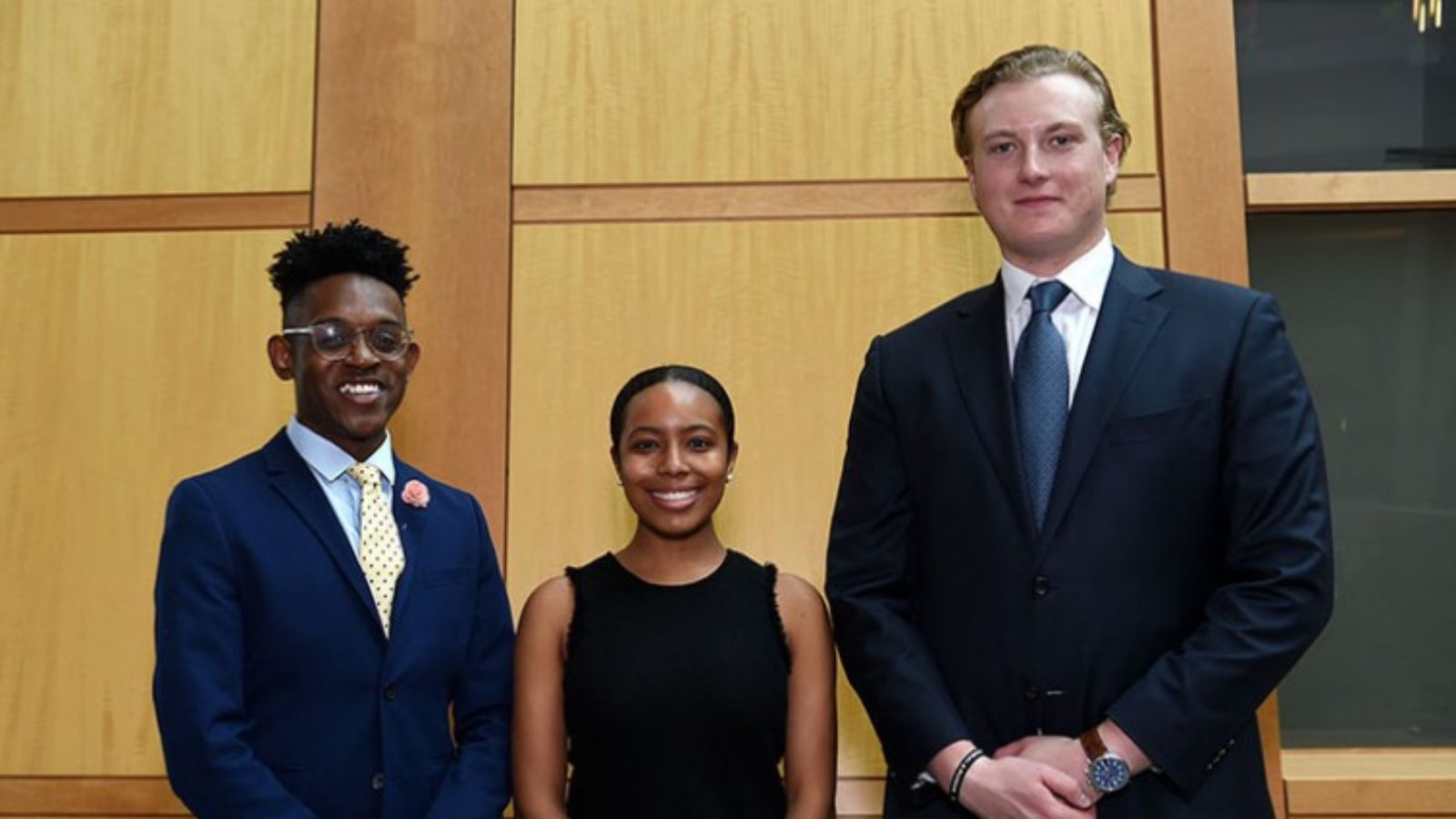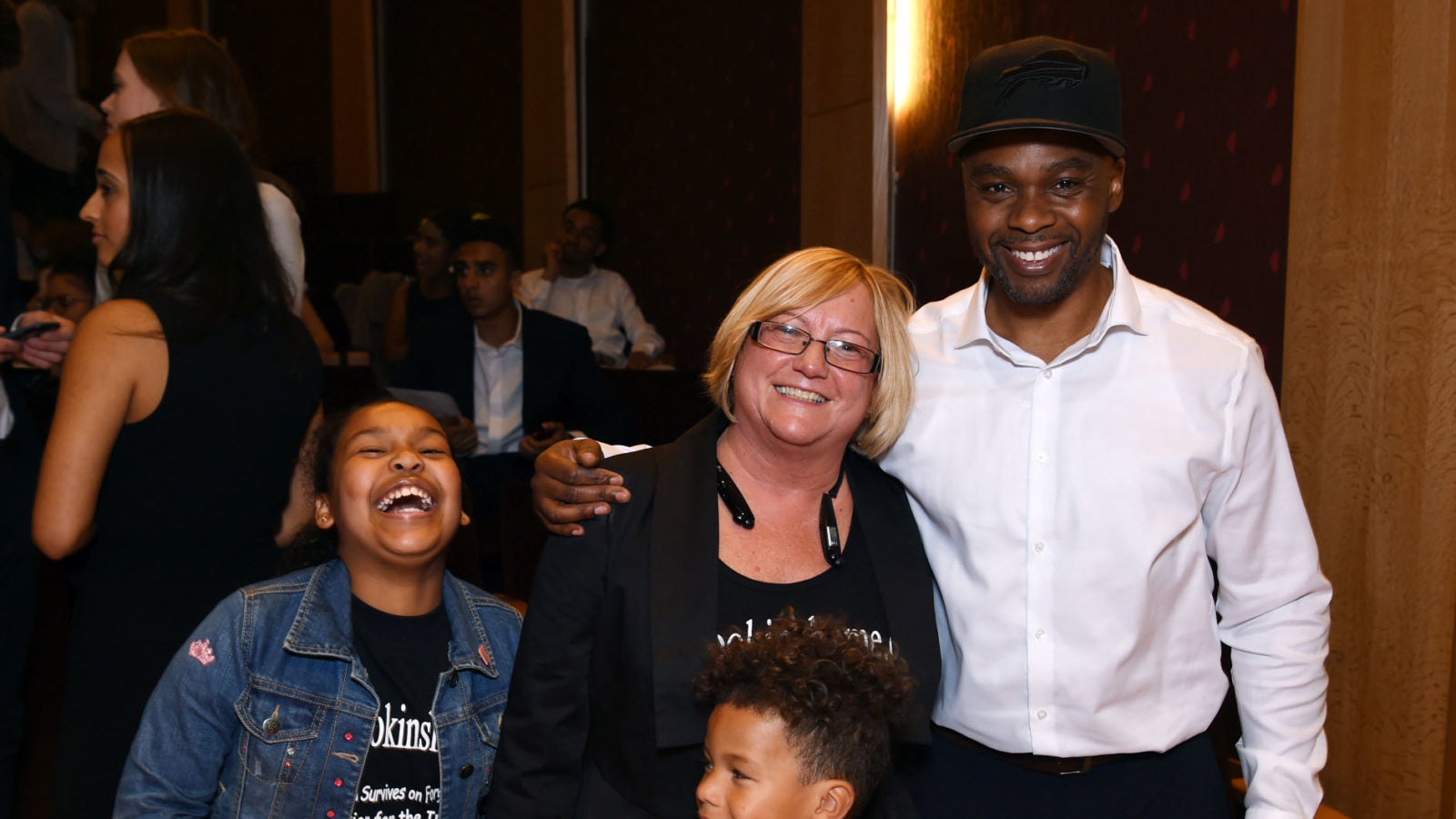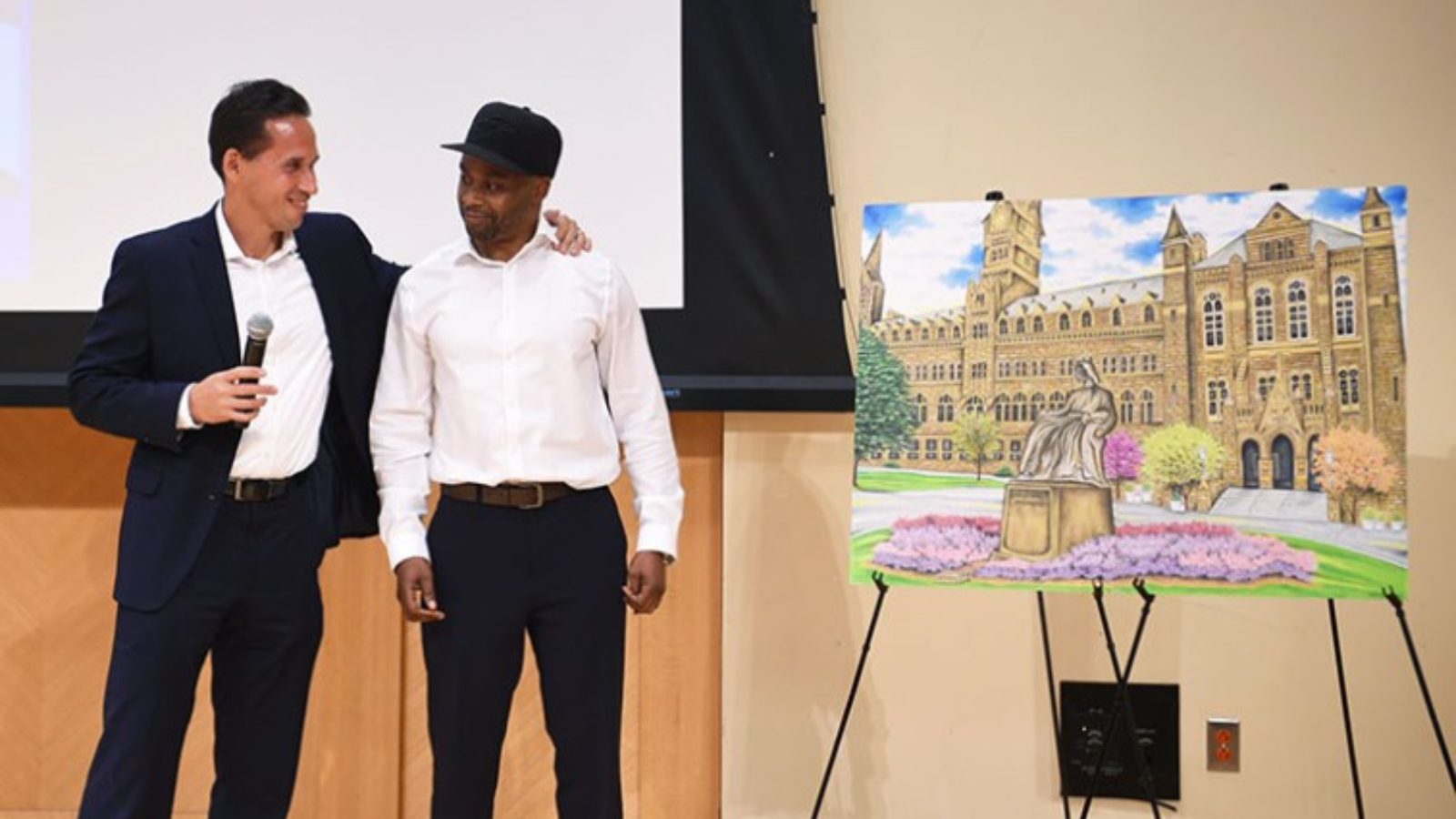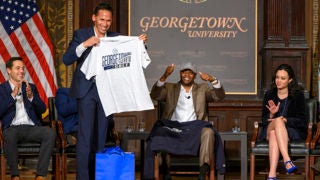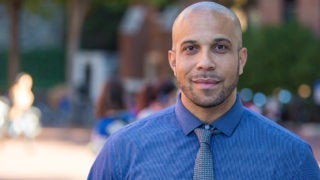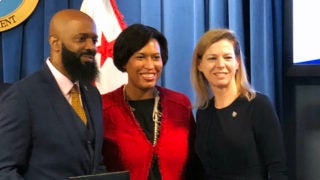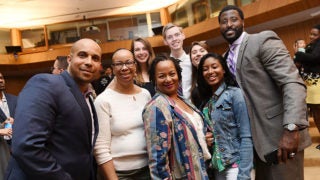Solid Presentations
Of all the individual cases students worked on this year – Christina Boyer, John Brookins, Tjane Marshall, James Fowler, Eric Riddick and Nanon Williams – Riddick’s is the farthest along.
Riddick, whose mother, Christine, and wife, Dana, were in the audience Wednesday night, has been imprisoned for more than 27 years, despite the only eyewitness in the murder case having twice signed an affidavit recanting his testimony.
Students Taylor Riddick (C’19) of Silver Spring, Maryland (no relation); Kendell Long (C’19) of DeSoto, Texas; and Alexander Buffone (C’20) of Greenwich, Connecticut, gathered so much important evidence in the case that they were asked last month to join Riddick’s attorney at a presentation to Philadelphia District Attorney Larry Krasner’s Conviction Integrity Unit.
The students said they discovered evidence that none of the forensic, ballistic or medical examiner evidence linked the murder to Riddick.
“We had a really solid presentation and it was received well, but now we’re waiting to hear what’s happening next,” explained Taylor Riddick, a government major and religion, ethics and world affairs minor who is contemplating law school but will work for a tech firm after graduation. “…It was definitely the hardest thing I’ve ever done. It was like defending your thesis, but someone’s life is on the line.”
Eric Riddick thanked the students, professors and family during the event by phone from the Chester State Correctional Institution in Pennsylvania.
“The young powerful minds at Georgetown – the world is depending on you,” he said.
No Easy Cases
“There are no cases here where it’s just a matter of the DNA is lying there, let’s just take it to the lab and if it comes out the right way, then we can let the person out of prison,” Howard said at the event. “No, we have really, really hard cases – some of the most difficult and challenging cases you can imagine where leads have vanished or legal appeals seem like they’re at a dead end and where hope has been just about lost. But I think you’ll agree by the end of the evening that we’re breathing some new life into these cases.”
All of the students working on Riddick’s case, and many of the others students in the course are now contemplating law school, either immediately or in the future.
“It’s been an honor just knowing that as undergraduate students we can have such an impact on one person’s life, but also on a larger, what I think is a corrupt system,” said Long, an African American studies major who now thinks law school would one day be a good fit for him. “I think Eric’s case highlights the all too common realities and the criminal justice or injustice system … so it’s frustrating and an honor at the same time.”
Boyer, Marshall and Brookins also spoke during the event from their respective prisons and thanked the students involved.
Exoneree Presents Drawing
Dixon, who was released this past September after three Georgetown Prison Reform Project students helped free him, worked 10 to 12 hours every day during his 27 years in prison creating hundreds of colored pencil drawings, mostly of golf courses and their surrounding landscapes.
At the event last night, Dixon presented a drawing of Georgetown’s iconic Healy Hall.
“It means everything,” Dixon said when Howard asked how it felt to make and give the drawing. “[The students] dedicated their time and effort into helping me get out of prison. I wanted to dedicate my time and effort to putting smiles on some people’s faces.”
He now works to help other wrongfully convicted prisoners and pursues life as an artist and offers his artwork for sale on his website, valentinodixon.com.
Never Giving Up
“We believe in you – we believe in your loved ones,” Howard told the families in the audience. “We’re here for you and we’re never ever going to give up trying to help get them out of prison.”
Among other programs, the Prisons and Justice Initiative at Georgetown runs the Prison Scholars Program at the DC Jail, offering courses at the DC Central Treatment Facility in partnership with the DC Department of Corrections.
The facility houses male and female DC residents awaiting trial, serving short sentences, or preparing to return to their communities after a longer period of incarceration with the Bureau of Prisons (BOP).
Last year, the university launched the Pivot Program, which aims to prepare returning citizens in DC for positions as both entrepreneurial leaders and productive employees.
The program is a collaboration among the university’s Prison and Justice Initiative, McDonough School of Business and Georgetown College, with support from the DC Department of Employment Services, the Mayor’s Office on Returning Citizen Affairs, and the DC Department of Small and Local Business Development.
Designed and delivered by Georgetown faculty, the program is a one-year transition and re-entry program centered on a blend of academic work and supported employment.
